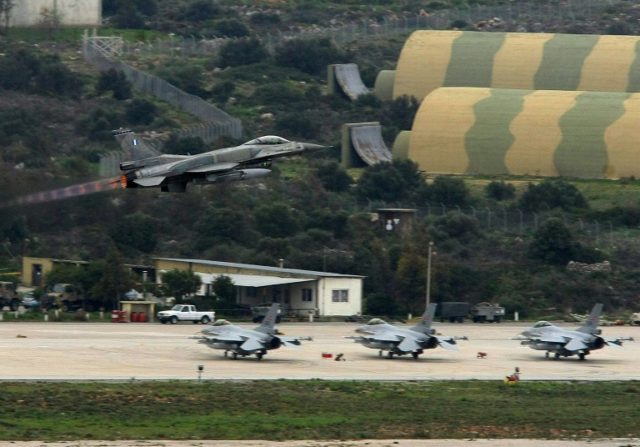Defense Minister Panos Kammenos, visiting Washington this week, said in remarks Tuesday with American counterpart Jim Mattis that Greece hopes to convince the United States to expand its military presence in the country.
Kammenos listed three cities – Volos, Alexandroupoli, and Larissa – as being on his government’s wish list of places to establish permanent U.S. military bases.
Kammenos’ request follows months of tensions with Turkey over the flight of Turkish soldiers to Greece believed to be involved in the July 2016 failed coup in that country and rising concerns that Greece cannot properly screen migrants traveling west from Syria to apprehend Islamic State terrorists disguised as refugees.
“I want to affirm that Greece considers the United States a strategic partner and ally, the only one I dare to say,” Kammenos said on Tuesday, according to Greek newspaper Kathimerini. “It is very important for Greece that the United States deploy military assets in Greece on a more permanent basis not only in Souda Bay but also in Larissa, in Volos, in Alexnadroupoli.”
The Pentagon released a report Wednesday on Kammenos’ visit, noting that Mattis particularly thanked Kammenos for his nation being one of the few NATO member states that contribute two percent of its GDP to spending, as the military alliance requires. “During yesterday’s meeting, the two leaders also discussed continuing efforts to combat Russian malign influence in the region, including the recent expulsion of two Russian diplomats from Greece,” the report adds. “Combating Russian efforts to undermine critical partnerships remains a key concern for all NATO allies, defense officials said.”
The Pentagon additionally thanked Kammenos for signing a deal to upgrade its F-16 fighter jets worth $1.5 billion.
Kammenos then headed to the State Department on Wednesday, where the two sides “discussed the strategic importance of the Eastern Mediterranean region and committed to further strengthen defense and security cooperation between Greece and the United States.”
The election of radical left-wing Prime Minister Alexis Tsipras in 2015 raised concerns in Washington that Athens would seek closer ties to Russia and China and move further away from America. While Tsipras, who named one of his sons after communist mass murderer Ernesto “Che” Guevara, has increasingly engaged with China, he has largely failed to deliver on his far-left campaign platform, instead using austerity measures to improve the Greek economy and bringing Greece closer to the United States.
To govern, Tsipras’ Coalition of the Radical Left (Syriza) party was forced to form a coalition government with the much more centrist Independent Greeks (ANEL) party, of which Defense Minister Kammenos is a member.
“At first glance, the bombastic 49-year-old leader of the ANEL party and Prime Minister Alexis Tsipras of Syriza may seem strange bedfellows, but both are vehemently anti-austerity and equally determined to renegotiate the country’s international bailout,” Kathimerini wrote of Kammenos’ ascent to the ministerial position in 2015.
Still, his move to more closely incorporate America into Greece’s national defense appears to have outraged some on Greece’s left. On Wednesday, the left-leaning newspaper Ta Nea described Kammenos’ trip as a “circus.”
“The Minister of Defense went in with a completely different agenda than what Alexis Tsipras seems to follow,” the newspaper argued, particularly on the issue of whether Greece of the Former Yugoslav Republic of Macedonia can use the name of “Macedonia.”
Greece faces two significant threats that may explain how the Tsipras government has decided to welcome further U.S. involvement in the country. The first is the increasingly belligerent government of Turkish President Recep Tayyip Erdogan. Members of the ruling Islamist Justice and Development Party (AKP) have threatened to invade Greece and have violated Greek sovereignty on multiple occasions over the presence of Turkish soldiers on Greek soil believed to have staged the failed coup against Erdogan. Athens has repeatedly demanded further evidence that the individuals in question did play a role in the matter, refusing to extradite them without the proper protocol.
Greece and Turkey are both members of NATO. NATO’s Article 9 requires all fellow nations to enter a conflict in defense of the aggrieved member nation if such a conflict occurs, though which side the other members take would take in a case of two NATO countries engaging in warfare is a question the alliance has yet to face.
Instability in the Middle East has also significantly damaged Greece’s immigration system. Greece has taken in thousands of refugees, most from Syria, who have traveled by sea west to avoid the conflict. In a report Wednesday, Ta Nea notes that Greek officials are particularly concerned that among these migrants may be sleeper members of the Islamic State or other jihadist groups. Greece has cooperated with the FBI, CIA, Interpol, and European authorities to identify at least 120 individuals of concern. The defeat of ISIS in Raqqa, its former “capital,” has triggered concerns that jihadists who survived the onslaught are joining civilian migrants and pretending to be fleeing areas of Syria attacked by forces loyal to Bashar al-Assad.

COMMENTS
Please let us know if you're having issues with commenting.